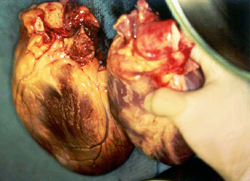Home › Treatment › Operations › Heart Transplant
 An enlarged, diseased heart (left) being replaced with a healthy donor heart (right)
An enlarged, diseased heart (left) being replaced with a healthy donor heart (right)In severe cases of heart failure, medication and supplementary treatments (such as the LVAD) may not be sufficient to maintain adequate function for long-term survival. Heart transplantation can provide patients with a healthy donor heart, significantly reducing the need for supplementary care and vastly improving quality of life. However, not every end-stage heart failure patient is a candidate for a heart transplant, and not every candidate can be matched with a donor heart. While each heart transplant site will vary in procedures and time, below is a general outline of what one may expect when becoming a candidate for a new heart
Whats involved in a Pre-Heart Transplant Evaluation Process?
There are several considerations that must be evaluated by your physician before recommending heart transplant surgery. This evaluation will occur at a heart transplant center. It is important to recognize that heart transplant surgery is a last resort and is not a viable solution to many cases of heart failure, especially those that can be managed using medication and supplementary devices. Your evaluation tests can include:
- Laboratory test- Blood test will rule out exposure to HIV, Hepatitis, and other diseases as well as studies to analyze kidney and liver function.
- Dental clearance- discuss dental health and assure the patient could safely proceed with surgery and receive specialized dental care in a transplanted patient.
- Chest X-ray- to determine heart size and lung condition
- Electrocardiogram- used to determine if there are any heart rhythm abnormalities
- Echocardiogram- provides information on heart size, how valves work, and can determine ejection fraction
- Left heart catheterization- This test will use the femoral artery to send a catheter into the heart in order to release dye to check for blockages in the coronary arteries
- Right heart catheterization- This test can be done at the same time as the left heart. This will provide information on the pressures in the heart and lungs
- Pulmonary function test- Measures the amount of oxygen your lungs are able to carry to your body
- Carotid Doppler study- This is an ultrasound of the arteries in your neck which determines if you have a risk for a stroke during surgery
- Peripheral Doppler study- This is an ultrasound of the arteries of the legs to test for blockages.
- Abdominal ultrasound- This ultrasound examines the abdomen, liver, gallbladder, pancreas, spleen, and kidneys
- Vaccinations
- Flexible sigmoidoscopy or colonoscopy
- Mammogram and Pap Smear for women
Once a patient has been evaluated, a committee consisting of a heart transplant team will discuss the selection criteria and decide whether a patient qualifies to be a transplant candidate. These criteria include but are not limited to the patient having end-stage heart failure refractory to medical therapy, having other medical and surgical options exhausted and absence of defined contraindications. Once approved, the patient is then placed on the United Network for Organ Sharing with a status of 1A- if in intensive care, 1B- when in hospital or at home on continuous IV medication, 2- when at home, or 7- inactive.
Surgery
During surgery most of the patients old heart is removed with only a small portion of the old heart remaining (atria and back of heart) to allow for sewing in of the new heart. The operation lasts 5-6 hours but can last longer depending on previous cardiac surgery history.
Life with a New Heart
Once surgery is complete the patient is placed into intensive care where they will recover. Within the first three months after surgery the patient will be encouraged to enter into a cardiac rehabilitation program were they will become accustomed to their new heart. The new heart requires the transport of hormones through the blood stream to increase heart rate. For this reason patients learn how to allow for a warm up and cool down period before and after exercise to allow the heart to increase or decrease heart rate depending upon physiological demand. Cardiac biopsies will be at regular intervals after surgery starting with once a week then decreasing until only one biopsy a year is required. Patients will continue a strict medication regiment taking up to 20 pills daily in order to prevent rejection of the new heart. This will continue for life. Additionally heart transplantation, and the medications may give rise to complications such as, diabetes, and high blood pressure.


 Español
Español












